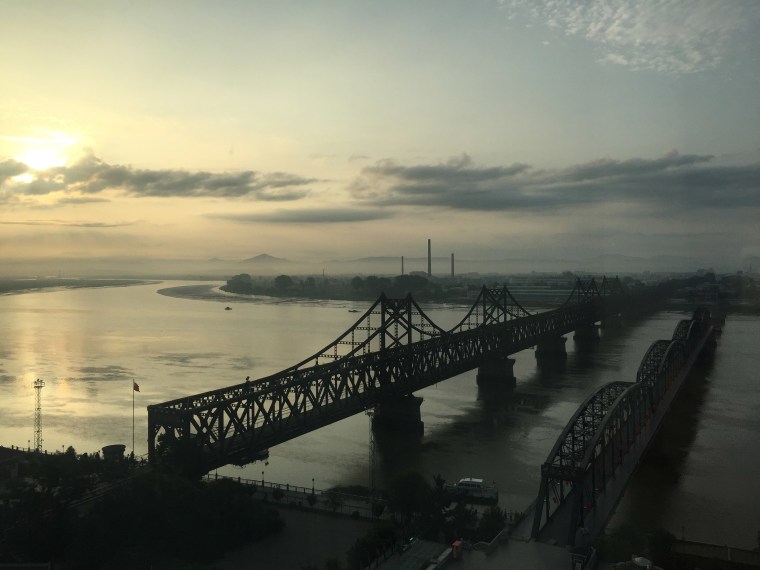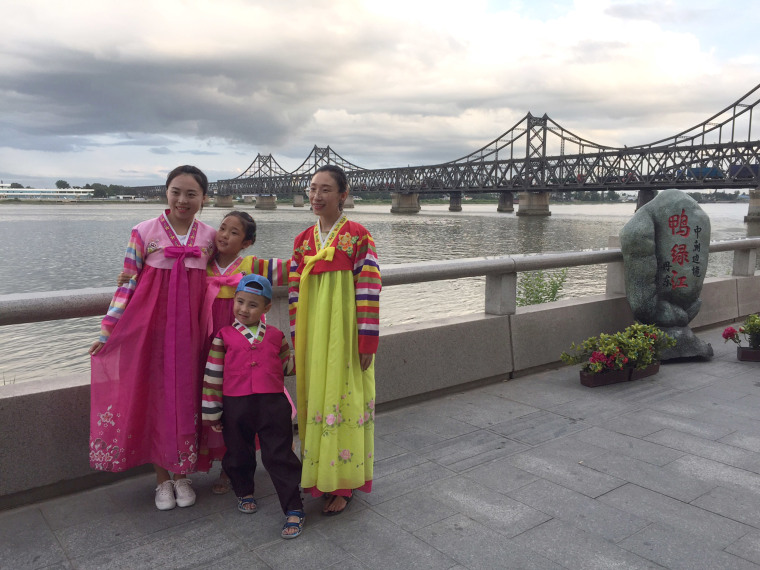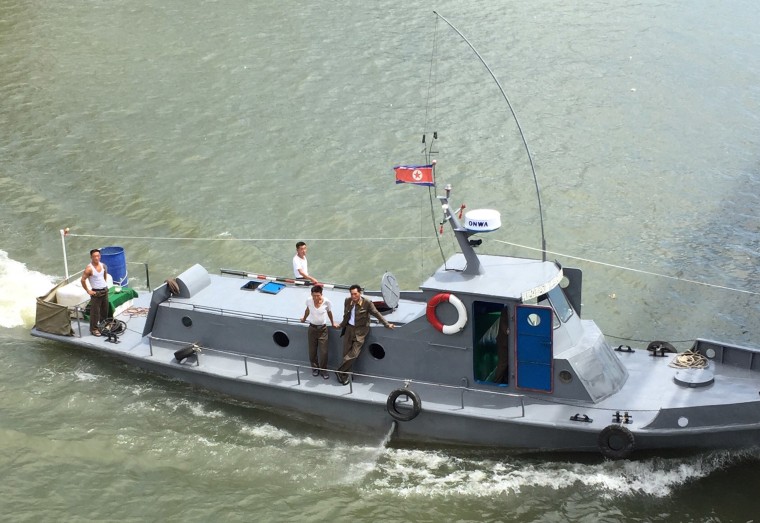DANDONG, China — President Donald Trump's war of words with North Korea may have cooled in recent days, but that hasn’t stopped Chinese tourists from jostling with one another to catch a glimpse at the reclusive country through the telescopes mounted on Broken Bridge.
They pointed, waved, took pictures, and pointed again at figures moving on the other side of the river as a speedboat raced by with passengers holding selfie-sticks.
"It's your sister's turn to look," said a woman on the bridge to a boy with binoculars. With an air of wonder, he turned to her and said, "I saw them!"

In Dandong, a bustling Chinese border city of 800,000 people, the main attraction is not a section of the Great Wall or even the fresh seafood: It's North Korea.
Barely half a mile separates it from the impoverished North Korean city of Sinuiju across the Yalu River.
There, the low-rise buildings, smoke stacks, and aging equipment are a stark contrast to the Miami-like shores of Dandong. Chinese boat cruises take tourists even closer, and with the zeal of safari-goers their cameras are poised to take photos of North Korean soldiers and farmers.
Rarely has North Korea ever been considered as much of a threat as it is today. The nuclear weapons ambitions of its dictator, Kim Jong Un, have ramped tension to an unsettling high and raised the specter of actual war.
"I know they are poor ... [It’s] the way China used to be."
While Kim recently announced a plan to fire missiles toward Guam, Trump has vowed military options if the North were to attack. The regime is also facing severe United Nations sanctions which could choke $1 billion dollars, or one-third of its exports, unless the missile testing stops.
Yet for all of Trump''s talk of "fire and fury," it is business as usual in Dandong, where tourists crowd at North Korea's doorstep and cross-border trade in most goods appears to continue.
"People are curious to see a foreign country," said 22-year old Hu Jianru, visiting from China’s Shanxi province. "[For me] I like their culture and want to see if it's like the image presented on the news."
North Korea has long been considered a pariah state by much of the world, yet for China, it remains a trading partner and a historically close Communist ally.

In 1950, when North Korea invaded the South, Mao Zedong sent Chinese troops to the peninsula to fight off the American-led offensive.
That sort of revolutionary lore has turned Dandong into a so-called red tourism destination, with statues to war heroes along the river promenade. The Broken Bridge, which was built by the Japanese and destroyed by the Americans, is China's only memorial to the Korean War.
"I know they are poor," said a woman about North Korea, after getting her photo taken wearing hanbok, a traditional Korean dress. "[It’s] the way China used to be."
While tourists consider Dandong a window to another world, as a trading hub it is North Korea’s lifeline. More than two-thirds of China’s trade with the regime passes through here along the single-lane Friendship Bridge that connects the two sides.
Upstream, there is a new $325 million multi-lane bridge that China completed in 2014, but it has collected dust because North Korea never built a road to meet it. Around the bridge, the residential towers and streets of "Dandong New Area" are nearly empty, testament to the expected boom in cross-border business that did not happen.
For over a decade, trade restrictions have been slapped on North Korea to attempt to dull the regime’s nuclear weapons ambitions. For the most part, sanctions have not significantly slowed trade between the countries.
North Korea’s trade volume with China rose 37.4 percent in the first quarter of this year, according to data released in April by China’s General Administration of Customs. And smuggling is said to thrive as sanctioned goods are disguised among other shipments.
"They are quite friendly," the owner of a photo developing business said about the North Koreans who visit Dandong to trade. "But they are not as open as [people from] the first and second world countries."
From dawn, the transport trucks start over the bridge from North Korea and most head to a central sorting yard that is not guarded, but signs warned against using cameras. There, the haulers unload North Korean goods and reload with Chinese products, many of them from factories around Dandong.
Then, the trucks line the streets around the customs office (as well as high-end retail stores and several restaurants with signs in Korean) and wait to have paperwork checked before heading back over the bridge along with dozens of Chinese trucks. On a recent afternoon, everything from cement to steel to bulldozers was seen being trucked across to the other side.
"China’s priority has always been stability and maintaining a buffer zone," said Sue Mi Terry, managing director for Korea at BowerGroupAsia. "China is afraid the regime could collapse."

North Korean drivers and traders can be spotted around Dandong wearing small red lapel pins bearing the face of Kim Il Sung, the dictator’s grandfather and the country’s founder.
Knock-off versions of the pin can be bought along the promenade for about $2, though a souvenir store claiming to sell "Korean products" tried to extract closer to $50 from a group of foreigners.
Tourism is a mainstay industry in Dandong, though Western journalists are typically met with suspicion. A woman who took exception to us interviewing a shop owner called police, in what she described as a "patriotic duty" to report foreigners in the area. Five minutes later, a SWAT team showed up.
Asked about the current tension involving North Korea, most people were oblivious, indifferent or dismissive.
"I am 30 years old," said a vendor selling cigarettes and trinkets near the river. "For as long as I can remember nothing has changed with the other side. It is still the same."
